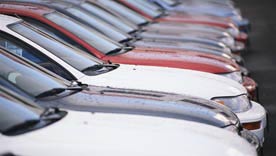Could cash-back incentives hurt consumers?
By: Luigi Fraschini for Driving Today
Date: 2005-01-17
The same hot-and-heavy competition that gives U.S. consumers significant value for their automotive dollar may actually be destructive to the consumer in the long run. That was a surprising message delivered by Jed Connelly, senior vice president of sales and marketing for Nissan North America Inc., to a large contingent of local and national auto journalists at the recent California International Auto Show in Anaheim.
"I want to touch on the dangers--hidden and obvious--of the current dependence on incentive marketing, if you can call that marketing," he told the group.
In a speech that drew national attention, Connelly said he feared the high-tech solutions that the auto industry continues to introduce--things like hybrid vehicles, fuel cells, rear vision cameras, and lane departure warning systems--will not get the public recognition they deserve under the intense pressure to advertise incentives.
"The industry pioneers set up the duck for us and laid out a blueprint for how great and powerful this industry can be," he said. "Yet, if we are not careful, all we will be known for is how we went to market--not the new technologies we bring and can continue to bring."
Connelly warned that the reliance on incentives might eventually prove injurious to the industry as a whole...and to the automotive consumer.
 "I believe that right now, right here, we stand at a critical departure point," he said. "We can continue to follow the path of escalating incentives that kicked into high gear in late September, or we can start to dial it back and compete on the strength of our products, rather than the size of the discount."
"I believe that right now, right here, we stand at a critical departure point," he said. "We can continue to follow the path of escalating incentives that kicked into high gear in late September, or we can start to dial it back and compete on the strength of our products, rather than the size of the discount."
The Nissan executive warned that by relying on incentive marketing could drain cash that might otherwise be spent on critical research and development. Connelly said that in a 17-million vehicle U.S. car market, for every extra $1,000 the industry spends on incentives, $17 billion in profits are given up by the manufacturers. Since today's incentives often average $3,000-plus, that means that an estimated $51 billion is being spent on incentives that could, in theory, be spent on developing new safety and convenience features and systems.
The solution?
The solution, he said, is to hold the line against incentives and "bring buyers--Millennials [Echo-Boomers], Gen Xers, and Baby Boomers--into our showrooms with exciting products, instead of enticing financing. The question of the moment, and the future, is what will turn on these Millennials? A $6,000 incentive or state-of-the-art technology?" asked Connelly. "A $0 down, 0 percent loan or a vehicle that is safe, environmentally and socially responsible, fun-to-drive and completely connected? And this, ultimately, is the not-so-hidden cost of the incentive trap: finding ourselves in the position of selling old products to a new generation."
The unanswered question is whether demand for cars, trucks and sport utility vehicles will continue if manufacturers begin to withdraw incentives. General Motors and Ford started the 2005 model year in October with lower incentives than in previous months, believing that fresh vehicles would help carry sales forward. But instead October was a disastrous month for the domestic auto makers, who quickly dialed up cash-back and special financing offers.
In today's crowded automotive marketplace it seems only new models that strike a particular chord with buyers can succeed without incentives. And even those prove to be short-lived. Witness the current glut of Volkswagen New Beetles and Chrysler PT Cruisers, two vehicles that once commanded retail prices over the manufacturer's suggested list. So the manufacturer that takes a solitary stand against incentives, even for the best reasons, could be very lonely indeed.
- Drivers.com article: Sticker price fiction
- Drivers.com -- articles and links on Buying and Selling Cars
- Drivers.com article: Please no gizmos
Comments to this article have been disabled.
